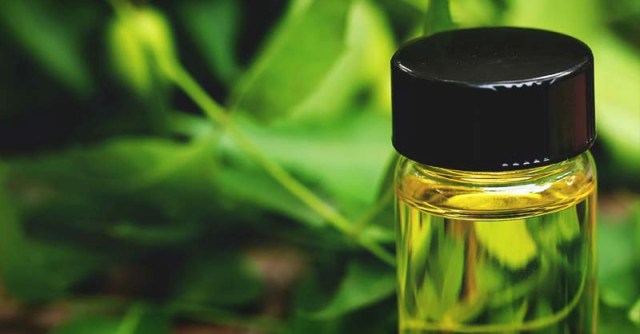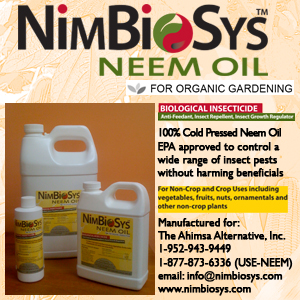Neem oil is a pretty big deal. It’s used mostly in this country as an organic insecticide and repellent, but it has been used in India for generations as a sort of all-natural pharmaceutical store.

Neem oil is made from the crushed seeds of the neem tree, a coniferous tree native to the Indian subcontinent, and its therapeutic properties are well known there. From the (relatively small) Wikipedia entry on the subject:
In India and Bagladesh it is used for preparing cosmetics (soap, hair products, body hygiene creams, hand creams) and in traditional Indian medicine, in the treatment of a wide range of afflictions. The most frequently reported indications in traditional writings are skin diseases, inflammations and fevers, and more recently rheumatic disorders, insect repellent and insecticide effects.
Traditional uses of neem include the treatment of acne, fever, leprosy, malaria, ophthalmia and tuberculosis. Various folk remedies for neem include use as an anthelmintic, antifeedant, antiseptic, diuretic, emmenagogue, contraceptive, febrifuge, parasiticide, pediculocide and insecticide. It has been used in traditional medicine for the treatment of tetanus, urticaria, eczema, scrofula and erysipelas. Traditional routes of administration of neem extracts included oral and topical use.
Neem oil has an extensive history of human use in India and surrounding regions for a variety of therapeutic purposes. Formulations made of neem oil also find wide usage as a bio-pesticide for organic farming, as it repels a wide variety of pests including the mealy bug, beet armyworm, aphids, the cabbage worm, thrips, whiteflies, mites, fungus gnats, beetles, moth larvae, mushroom flies, leaf miners, caterpillars, locust, nematodes and the Japanese beetle. Neem oil is not known to be harmful to mammals, birds, earthworms or some beneficial insects such as butterflies, honeybees and ladybugs. It can be used as a household pesticide for ant, bedbug, cockroach, housefly, sand fly, snail, termite and mosquitoes both as repellent and larvicide (Puri 1999). Neem oil also controls black spot, powdery mildew, anthracnose and rust (fungus).
A co-worker has some anecdotal evidence that it works great as a basement treatment to keep crickets and all the other creepy crawlers that can inhabit our subterranean habitats. I suppose theoretically you could even use it for a lawn treatment to keep some of the less desirable pests away.
Neem has virtually no effect on beneficial insects like bees and butterflies (as long as they are not sprayed directly). And since its all-natural it doesn’t harm plants either, and in fact, it works from the inside out. Instead or in addition to topical applications you can add neem to your watering regimen and it will protect your plants at a cellular level. Of course it takes a little longer than real chemicals, but it leaves everything 100% non-toxic.
How Neem Works
There are dozens of active compounds in neem very similar to the natural hormones found in insects. The presence of neem blocks the functioning of the real hormones, and predictably, chaos ensues for the insect. Insects “forget” to eat, to mate, or they stop laying eggs. Some forget that they can fly. If eggs are produced they don’t hatch, or the larvae don’t molt. Obviously this is going to have a detrimental affect on the population, and after a small period of time it will collapse. It may take as much as a couple weeks, but it will happen.
The reason it doesn’t affect the good insects is because it must be ingested to do damage, and good insects (obviously) don’t eat your plants. As mentioned above though, it is probably ill-advised to give them a bath in the stuff, so save your spraying for times when beneficial insects aren’t active like early morning or late afternoon.
A neem garden spray of 0.5% to 1% is a good general purpose solution. Depending on the purpose you may want to increase that to up to 2%. Use your own observations and common sense. Keep in mind that neem oil insecticide does not kill insects instantly. Wait for at least a week to judge the effects.
For 1 liter of a 0.5 % dilution of neem plant spray you need:
- 5 ml neem oil
- 1-2 ml insecticidal soap or other detergent (helps oil mix with water)
- 1 liter warm water
Apply that once every couple weeks for a preventative effort or more for stopping an infestation and you should see results in a week or two.
If you haven’t considered, or even heard, of neem oil and have been about wondering ways to combat insects naturally then give it a try. Centuries of folk medicine can’t be wrong.
Drew Landis is Social Networking Coordinator for an online greenhouse retailer.



Comment here